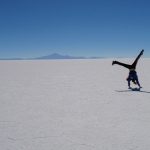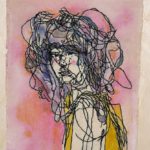My team is aces. We work well together, and hard, because we want to be ninjas. And as part of our training, we make sure we’re prepped for interviews—most of the time. And that’s why we’re usually as ready as a team can be for all the stars, sais, and knives a journalist may throw at us.
But the other day, when we dragged a heavy wooden bench up to the stainless steel table at a local coffee hangout, we were NOT prepared for the interview that ensued.
Among the caffeine steam and hip-hop, the journalist made herself comfortable, notebook revealing a naked page, unblinking poker eyes scanning us. After a quick introduction and pen click, she dove into the interrogation. Easy questions as appetizers. Hard questions as the entree. Impossible questions for dessert. Throughout, she unapologetically crawled into every hiding place our business minds were attempting to conceal.
Inside Mary’s: a wise and beautiful explanation of our publishing experiences thus far, but alas, limited information for the journalist’s most pressing questions.
Inside Jake’s: an intelligent and poetic description of our connection as a team, but regrettably, thin details on certain subjects of query.
Inside mine: a lint ball, one Lee press-on nail, and a condom wrapper.
So as my team and I hesitated and fumbled, the interview nosedived. Under my hoodie, beads of cold sweat rolled down my torso.
“The book-selling world is really hard, a lot harder than I thought it would be, and sometimes—straight up weird,” I said, tugging on one of my drawstrings. I knew I should quit. “Like . . . take the Oklahoma City airport for instance. They won’t accept my book because of the language,” I continued.
“What do you mean?” the interviewer asked, hovering her pen above her notebook.
I lingered, mouth open like a cargo door. “Welllllllll, they said the language was too severe, I think because of the cuss words.”
The interviewer straightened. “Which cuss words do you use in your book?”
I swallowed nails.
“All of them?” she asked.
“Well . . .I . . . yeah. I think most of them . . . I guess.”
“Like the c-word? Do you use the c-word?”
“Um . . .” I looked up at the ceiling and took a deep breath, exhaled a rush of regret, and then just let it all hang out. “I don’t know. Probably. I use that word overseas, and sometimes I use it here, so I’m sure I used it in Good Globe.”
The interviewer deadpanned me.
“I love the c-word,” she said casually. “I like to call men the c-word. My daughter is a feminist. She’s studying Women’s Studies at OU. She uses the c-word fervently.”
I threw my head back and laughed like a hyena. “Awesome! That’s great. I love it.”
But as soon as my cackling stopped, she restarted probing. And the whole time, I couldn’t read her—love or hate, curiosity or disregard—none of the usual hints were there. Fog is not ideal weather for interviews.
So THANK GOD, the pain finally ended when she made one last mystery scribble in her notebook and announced she had everything.
“So do I get a copy of the book?” she asked.
Jake slid her a fresh copy of Good Globe. “It’s all yours.”
“Great,” she said, resting it by her coffee cup and turning to me. “Are you going to sign it?
“Of course,” I said.
She handed me her pen and pushed the book toward my hand. I opened it to the first blank page. And there, I decided to take one last roundhouse kick at either saving or totally shattering our interview.
In the large, blank space—I wrote, “Thanks for listening, you cunt.”
I pushed the book back toward her. Serious. Breath held.
She read it, looked at me . . . and then asked for a hug.
“That’s probably the best inscription I’ve ever had,” she said.
Kiiiiiiia, mofo’s.







Recent Comments